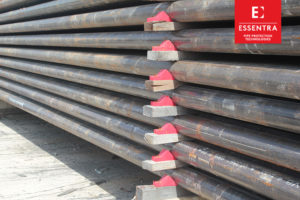In industries that handle large and heavy pipes, ensuring their safety and stability during transportation and storage is critical. Pipe chocks play a vital role in preventing the movement of cylindrical objects like pipes and ensuring they stay securely in place.
But beyond this basic function, a wide range of pipe chocks are designed to cater to specific needs based on the type of pipe and industry requirements. Here, we’ll explore the different types of pipe chocks and their respective applications.
What Are Pipe Chocks?
Pipe chocks are devices used to secure pipes by preventing them from rolling, shifting, or moving, especially during transportation or storage. They are typically placed on either side of a pipe, creating a stable cradle that holds it in place. This is particularly important when dealing with large-diameter pipes, as their weight and size make them prone to dangerous rolling or sliding if not properly secured.
Types of Pipe Chocks
While the basic purpose of all pipe chocks is the same, they come in various types tailored to specific needs. Let’s dive into the most common types of pipe chocks.
1. Wooden Pipe Chocks
Wooden pipe chocks are among the most traditional and widely used options, especially in shipping and storage. They can be custom-sized based on the pipe diameter and are often secured using nails or straps to ensure they stay in place.
Uses:
– Wooden chocks are ideal for securing smaller to mid-sized pipes.
– Commonly used in shipping containers or on flatbed trailers.
– Best suited for temporary or short-term applications where heavy-duty support isn’t needed.
Advantages:
– Inexpensive and easy to replace.
– Lightweight and simple to use.
2. Rubber Pipe Chocks
Rubber pipe chocks are designed to provide both a cushioning effect and a solid grip, making them an excellent choice for handling pipes that require some shock absorption. They are often used in scenarios where minimizing movement or vibration is essential, like during transportation or storage on uneven surfaces.
Uses:
– Great for pipes that are prone to vibration during transport, such as those made of fragile materials like PVC.
– Ideal for use on sloped or rough terrain, as the rubber’s grip helps keep pipes stable.
– Widely used in construction and oil and gas industries where pipes must be frequently moved.
Advantages:
– Offers high friction to prevent pipe movement.
– Resistant to moisture and most chemicals, making them durable for outdoor use.
3. Steel Pipe Chocks
For industries handling exceptionally heavy or large-diameter pipes, steel pipe chocks are often the go-to option. These heavy-duty pipe supports are made of durable steel that can support significant weight without bending or breaking. Steel chocks are typically used in industrial settings where large oil, gas, or water pipelines are stored or transported.
Uses:
– Perfect for securing large, heavy pipes, especially in the oil and gas industry.
– Often used in long-term storage situations or where pipes are stored in vertical stacks.
– Excellent for high-load situations, such as transporting steel or iron pipes on trailers.
Advantages:
– Extremely durable and resistant to damage.
– Suitable for long-term and heavy-duty use.
4. Plastic Pipe Chocks
Plastic chocks, often made from high-density polyethylene (HDPE) or other polymers, offer a lightweight yet durable alternative to wood or steel. They are especially popular in environments where corrosion is a concern, as plastic doesn’t degrade when exposed to moisture, chemicals, or other harsh conditions.
Uses:
– Commonly used for smaller pipes or in situations where exposure to moisture is likely, such as on boats or in marine environments.
– Ideal for use in industries requiring corrosion-resistant materials, such as wastewater management.
Advantages:
– Lightweight and resistant to corrosion.
– Cost-effective for certain applications.
5. Adjustable Pipe Chocks
Adjustable pipe chocks are designed for maximum flexibility. They allow users to adjust the chock’s position to accommodate various pipe sizes. These pipe wedges can be made from materials such as steel or rubber, and they come with adjustable brackets or sliding components that allow for quick resizing.
Uses:
– Perfect for industries where different pipe sizes are handled regularly.
– Often used in warehouses, shipping yards, or industrial settings where quick adjustments are needed.
Advantages:
– Highly versatile and reduces the need for multiple types of chocks.
– Saves time during the loading or storage process.
Find the Perfect Pipe Chocks for Your Project
At MSI Pipe Protection Technologies, we understand the importance of selecting the right pipe chocks to ensure your valuable pipes’ safety, stability, and protection. Whether handling small-diameter or large industrial pipes, we offer a wide range of high-quality pipe chocking solutions tailored to your requirements. Call us now!




